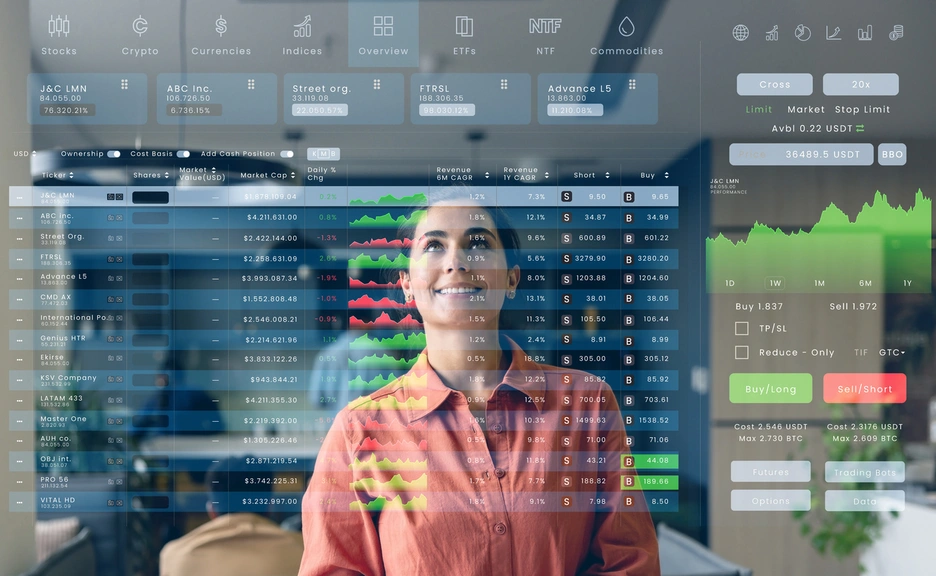Six Cutting-Edge Technologies to Accelerate Financial Health

This week, IDB Invest will participate in the 9th Annual Microfinance Conference in Costa Rica.
The forum brings together partners from the private and public sectors, aligning with IDB Invest's ongoing effort to achieve the ambitious goal of leveraging financial institutions for regional financial health.
A key component of such an ecosystem-wide transformation will be the use and scale of key technologies.
IDB Invest is using its participation in this conference to dive deeper into these cutting-edge technologies:
1. Fast Retail Payment Systems: Instant and Accessible
Fast retail payment systems are digital platforms that enable instant, secure, and low-cost transactions between individuals, businesses, and governments. They are revolutionizing the way people transfer money and make payments.
PIX in Brazil is a proven market changer, allowing for free and instantaneous transfers.
The technology offers a replicable model in other countries in the region, and the IDB Group is leading efforts to support digital public infrastructures and public policies that facilitate the implementation and interoperability of fast payment systems.
Pilot countries include Colombia, where the Bre_B national instant payments system is expected to launch in September 2025, in Ecuador and Suriname.
2. Open Finance: The Power of Data Sharing
Open finance is emerging to facilitate the sharing of financial data across platforms, creating more personalized and customer-centric financial products.
By allowing financial institutions to securely access and share consumer data, Open Finance supports banks to offer tailored services to a broader audience, including unbanked or underbanked individuals.
The IDB Group has spearheaded research on open finance and its ecosystem development, most notably in Chile, where there are efforts to promote regulatory frameworks for safe and responsible open finance.
3. Neobanks & Fintechs: A New Era of Digital-First Banking
Neobanks, such as NuBank from Brazil, Ualá from Argentina, and Alba from Mexico, are financial technology firms that operate online and offer a wide platform of services.
They are competing with traditional banks in ways never expected, and are now meaningful players in Latin America and the Caribbean.
Meanwhile, more niche service providers, such as fintechs, are helping to reduce reliance on cash, improve financial planning, and provide better access to credit.
NuBank, the largest and most well-known neobank, has already become the region’s largest bank by customer base, with over 115 million clients across Brazil, Colombia, and Mexico.
Their digital-first approach has enabled them to reach underserved populations, with simplified, transparent, and low-cost financial products, addressing financial health in numerous ways and over the long term.
4. Generative AI: Personalizing Financial Services
Generative artificial intelligence (AI) is one of the most forward-thinking technologies in the financial services sector, as it can create alternative data models that can assess creditworthiness through digital footprints and psychometric data.
This has the potential to break the cycle of high borrowing costs and predatory lending that limits financial health.
As IDB Invest highlighted in previous blog posts, it is essential to emphasize the responsible use of AI, particularly in safeguarding data privacy.
The IDB Group is actively engaging with regulators to ensure that AI technologies are used ethically and that they foster inclusivity while maintaining privacy and security.
5. Blockchain: Transparency and Efficiency in Finance
Blockchain is a decentralized, digital ledger technology that securely records transactions across multiple devices.
IDB Lab and IDB Invest’s collaboration with Davivienda Bank to issue Colombia's first blockchain bond is an example of how this technology can enhance transparency and reduce bureaucracy in financial reporting.
Bond authorization, initial registration, issuance, trading, and compliance with the National Registry of Securities and Issuers were completed in a blockchain to test ways to streamline the process and reduce its costs over a complete trading cycle in the Colombian capital markets.
Additionally, blockchain is being used by Fundación Génesis in Guatemala to explore if it can communicate optimal soil conditions to farmers.
IDB Lab supported the creation of digital payments at Fundación Génesis by fostering smart ATMs and digital wallets for customers in rural areas.
6. Programmable Money: Revolutionizing Payments
Programmable money, such as central bank digital currencies (CBDCs) and stablecoins, can enhance the safety of banking. So far, uptake of the Bahamas' Sand Dollar is slow, yet it seeks to make banking faster and more efficient for a broader number of Bahamians.
As programmable money gains traction, it could enable conditional cash transfers, remittances, or weather-related payments tied to behavioral incentives. Such technology better regulates itself compared to traditional currency. The next frontier includes “inclusive RegTech” and “SupTech” (Supervisory Tech) to support regulatory and supervisory compliance, respectively, without stifling inclusion. The IDB’s public-private work will be showcased at future events around the region.
The Path Forward
Existing technologies, coupled with IDB Invest's role in strategizing their forward-thinking applications, can enable banks to reach diverse customer segments at different stages of life and across various sectors.
To support the policy side, the IDB informs and designs policies for human-capital development, effective financial supervision, and a legal framework for technology to thrive responsibly.
These innovations demonstrate the potential to reduce costs, stimulate business growth, and enhance financial health through their broader range of services, ultimately fostering long-term prosperity.
LIKE WHAT YOU JUST READ?
Subscribe to our mailing list to stay informed on the latest IDB Invest news, blog posts, upcoming events, and to learn more about specific areas of interest.
Subscribe



